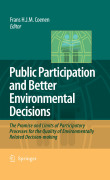
Public participation and better environmental decisions: the promise and limits of participatory processes for the quality of environmentally related decision-making
Coenen, F.H.
Public Participation and Better Environmental Decisions is about a specific ‘promise’ that participation holds for environmental decision-making. Many of the arguments for public participation in (inter)national environmental policy documents are functional, that is to say they see public participation as a means to an end. Sound solutions to environmental problems require participationbeyond experts and political elites. Neglecting information from the public leads to legitimacy questions and potential conflicts. There is a discourse in the literature and in policy practice as to whether decision-making improves in quality as additional relevant information by the public is considered. The promise that public participation holds has to be weighed against the limitations of public participation in terms of costs and interest conflicts. Examinesthe relation between public participation and the quality of decision making from a functional perspective Contributes to an important discourse on the role of public participation in environmental decision making Explores cases of environmental decision making in different policy settings and countries and from different disciplinary angles INDICE: 1. Introduction.- 2. Citizens’ Voices in Environmental Policy: TheContribution of Integrated Assessment Focus Groups to Accountable Decision-making.- 3. The Use of Focus Groups in Assessing Ethnic and Racial Groups Concerns about Nuclear Waste Cleanup.- 4. Planning Cells and Citizen Juries in Environmental Policy: Deliberation and Its Limits.- 5. The Power Visioning: The Contribution of Future Search Conferences to Decision-making in Local Agenda 21 Processes.- 6. Participatory Decision-making for Sustainable Consumption.- 7. Hazardous Waste Anyone? A Comparison of Participatory and Non-participatory Approaches to Hazardous Waste Siting.- 8. Fora, Networks and Public Examinations:Building a Sustainable Development for South East England.- 9. Concepts of Participatory Decision-making in Dutch Infrastructure Planning.- 10. Local Agenda 21: ‘Meaningful and Effective’ Participation?- 11. Conclusions.
- ISBN: 978-1-4020-9324-1
- Editorial: Springer
- Encuadernacion: Cartoné
- Páginas: 235
- Fecha Publicación: 01/12/2008
- Nº Volúmenes: 1
- Idioma: Inglés
